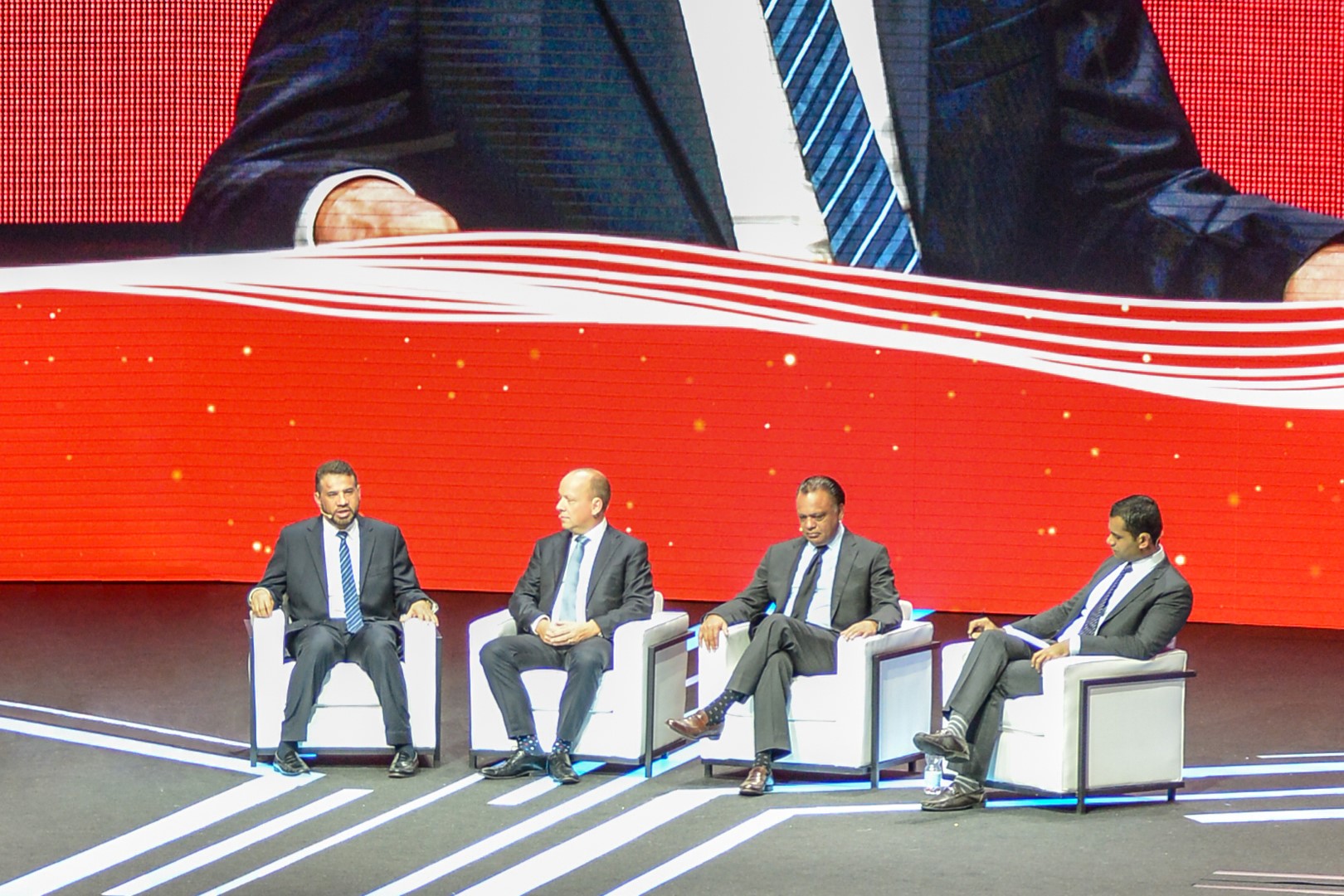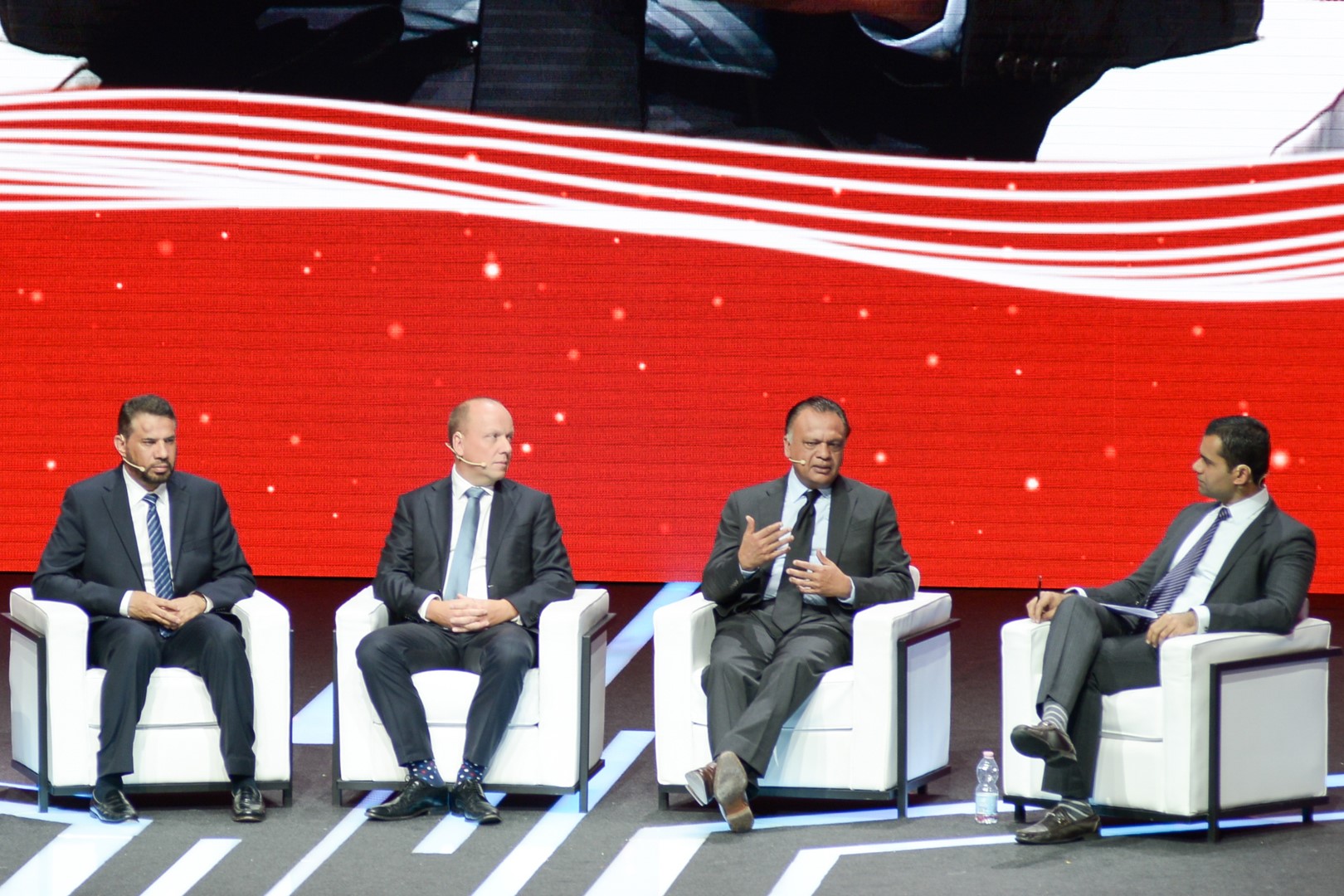-
Featured Solutions
-
Energy Transition
Energy technology to help the industry advance on the path to net-zero
-
Hydrogen Technologies
Advanced technologies to accelerate hydrogen deployment
-
Geothermal Solutions
Experience and expertise to redefine possibilities in geothermal
-
Carbon Capture, Utilization, and Storage (CCUS)
Integrated suite of solutions to capture, process, store, and monitor CO2 emissions
-
Emissions Abatement
Solutions to monitor and reduce emissions from industrial operations
-
Remote Operations
Digital operations, monitoring and testing capabilities to serve critical industries
-
AI by BakerHughesC3.ai
Enterprise-scale artificial intelligence for energy operations
-
Liquefied Natural Gas
Industry leading solutions for long-term reliability, availability, and project success
-
Industrial Technology
Solutions to improve efficiency and uptime in processing and manufacturing industries
-
Cordant™
Flexible and connected digital solutions for industrial machines, equipment, and systems
-
Mature Assets Solutions
Reviving mature Assets and accelerating impact through integrated solutions
-
Flare Reduction
Creating new opportunities for value recovery and efficiency in flare reduction.
-
-
Energy Transition
Energy technology to help the industry advance on the path to net-zero
-
Products & Services
-
Oilfield
-
On-Demand Solutions
-
Onshore Composite Pipe
-
Evaluation
-
GaffneyCline Energy Advisory
GaffneyCline Energy AdvisoryFrom high-level strategy to ground-level execution, trust a proven team of energy advisors to help deliver your projects with greater speed, certainty, and efficiency.
- Process & Pipeline Services
-
Drilling
-
Completions
-
Electrification in downhole completions
-
Maximizing Return on Efficiency
-
Completion Fluids
-
Intelligent Completion Systems & Flow Assurance
-
Gas Lift Systems
-
Isolation Valves
-
Liner Hanger Systems
-
Multilateral Systems
-
Multistage Completions
-
Packers
-
Perforating
-
Sand Control
-
Stimulation & Fracturing
-
Subsurface Flow Control
-
Subsurface Safety Systems
-
Tubular Services
-
Well Monitoring and Analytics
-
Electrification in downhole completions
-
Production
-
Integrated Well Services
Integrated Well ServicesOptimize your well operations with proven, comprehensive project management service and support
-
Processing
-
Subsea
-
Well Intervention
InterventionReduce the time and cost of interventions, from well construction to abandonment.
-
Surface Pressure Control
Surface Pressure ControlMaximize drilling efficiency with safe, sustainable, cost-effective well control
-
Decommissioning
-
Digital
-
On-Demand Solutions
-
Turbomachinery & Process Solutions
-
Gas Turbines
Gas TurbinesIndustry-leading gas turbine technologies for mechanical drive and power generation (50/60 Hz)
-
Steam Turbines
Steam TurbinesProven modular designs with the flexibility to meet operating challenges across the oil and gas, and power generation industries.
-
Centrifugal & Axial Compressors
-
Reciprocating Compressors
-
Generators, Synchronous Condensers and Motors
Generators, Synchronous Condensers and MotorsElectro-mechanical solutions that are engineered to perform, built to last, with full life-cycle support.
-
Gearboxes & Gear Couplings
Gearboxes & Gear CouplingsHigh-performance gearing and gear coupling solutions and services to solve the most complex power transmission challenges
-
Expanders & Air Cooled Heat Exchangers
Expanders & Air Cooled Heat ExchangersProviding ultra-high energy efficiency for cryogenic and waste-to-value applications.
-
Plant, Module & Process Solutions
-
Remote & Digital Solutions
Remote & Digital SolutionsSmart solutions to help industry operate safely, securely, and efficiently while reducing costs.
-
Turbomachinery Services
Turbomachinery ServicesComprehensive capabilities ensuring the highest availability, reliability, and efficiency for the entire life of your equipment.
-
Centrifugal Pumps
Centrifugal PumpsA proven range of single and multistage, horizontally and radially split designs for long-term reliability in harsh conditions.
-
Valves
-
Talent Development
Talent DevelopmentExtensive and training solutions to develop talent and improve expertise to reduce risks and increase productivity.
-
Gas Turbines
-
Software & Analytics
-
Cordant
-
BakerHughesC3.ai
BakerHughesC3.aiEnterprise-scale AI to make energy operations safer, cleaner and more efficient
-
NDT Software
-
Oilfield Services Digital
-
Cordant
-
Measurement, Testing & Controls
-
Cyber Security Services
-
Flare Management
Flare ManagementUltrasonic flow meters and emissions management solutions for superior flare gas flow measurement and control
-
Flow Meters
-
Industrial Asset Inspection
-
Industrial Radiography and CT
-
Machinery Asset Health & Consulting Services
-
Machinery Diagnostic Services
-
Monitoring Systems
Monitoring SystemsBently Nevada offers condition monitoring systems for plantwide machine monitoring protection.
-
Non-Destructive Testing
-
Pressure Sensors
-
Process Analyzers
-
Remote Monitoring & Diagnostics
-
Remote Visual Inspection (RVI)
-
Robotic Inspection
-
Roller Bearing Condition Monitoring
-
Sensors
SensorsOur customers rely on the quality and integrity of our vibration sensors to monitor and measure their machinery’s performance.
-
Supporting Services Agreements
-
System 1 Condition Monitoring Software
System 1 Condition Monitoring SoftwareAn all-in-one answer to even your most difficult machine asset management and health monitoring challenges.
-
System Design Installation
-
Test and Calibration Instruments
-
Ultrasonic Testing
-
Cyber Security Services
-
Brands
-
Bently Nevada
-
Bently Training
-
Cyber Security Services
-
Machinery Asset Health & Consulting Services
-
Machinery Diagnostics Services
-
Monitoring Systems
-
Remote Monitoring & Diagnostics
-
Roller Bearing Condition Monitoring
-
Sensors
-
Supporting Services Agreements
-
System 1 Condition Monitoring Software
-
System Design Installation
-
Bently Training
-
Druck
-
Panametrics
-
Reuter-Stokes
-
Waygate Technologies
-
Oilfield
-
Company
- Baker Hughes
-
Sustainability
-
Our Sustainability Performance
-
People
-
Planet
PlanetWe are committed to operating with sound environmental practices to protect the planet.
-
Principles
PrinciplesOur culture promotes and encourages employees to act with integrity, responsibility, and compliance every day.
-
Our Sustainability Performance
- News & Knowledge
-
Resources
-
Resources Center
-
Supplier Resources
-
Channel Partner Resources
-
Customer Resources
-
Additional Resources
Additional ResourcesMore information related to Baker Hughes.
-
Resources Center
The panelists covered a lot of ground with observations about the industry overall as well as insights on their own organizations’ activities. Two key themes were the importance of finally delivering on the promises of digitization, along with a focus on recruiting and developing agile-minded people.

How are you working to reduce the inherent risk with deep water and also enhance its position on the supply curve?
Barclay: “We’ve got to work through the whole value chain with our clients and partners, vendors, suppliers to leverage the data we have available at the moment, to improve the efficiency of the whole process. As an industry, we have to be prepared for disruption and we have to be prepared very soon.”
How are you thinking about your portfolio and your innovation priorities to balance growth, affordability, and sustainability for your business?
Mathur: [In India] “There’s been a lot of innovation by local governments to optimize the energy mix by allowing normal citizens to set up solar rooftops, but more importantly to upload electricity back into the grid. But I can’t see a shift away from coal in the medium term. In our company, we are an oil and gas focused company, and I don’t see that changing for a long time. Having said that, sustainability becomes key. One of the key targets we have taken is that in the next five years our own energy requirement is going to be about 150 MW, and we want to do it off solar. We have a gold standard in emissions. And it’s not just for us, it’s a standard that we want others to copy.”
In terms of innovation, how are you thinking about managing growth, and also thinking about sustainability had sustainable materials?
Al-Maker: “It’s around digitization, and harnessing the full value of digitization. It’s about the right competencies, subject matter experts and data scientists, and agility. Looking at the entire chain, and bringing efficiency in every single stage of the industry, this will take the usage of energy to the next height in terms of intensity improvement… The chemical industry is taking a leading role particularly regarding plastics and converting it into its original form to use it again. It will require communities helping us to collect the waste, will require new technologies to convert into the feedstock, and it will need an enhancement in the process itself.”
Innovation is obviously going to separate the winners from the losers. But an important aspect of it is actually building an innovation-centric culture. So how are you thinking about it in the context of your organization?
Mathur: “It starts with recruitment. Of course you look for competence and deep knowledge and skills. But on the soft side, we aggressively pursue people who have a deep sense of curiosity, ability to change, and ability to learn. Whether at an engineer trainee level or at a senior level. We also pursue diversity in any form and shape, because we genuinely believe that people ask different questions if they are different.”
How are you engaging yourself in an ecosystem of partners to accelerate invasion?
Barclay: “There is a number of key areas here. One of them is making sure we have the platforms for collaboration. But equally important is instilling in the organization that we want to collaborate, that we want to share; and that the way we will be successful is by sharing our knowledge, and taking the knowledge of our partners into the projects… We’ve got to look to reduce manpower usage, to look for more automation, we’ve got to look for artificial intelligence to develop our process design, and everything we’re doing. It has to be top down, it has to be disruptive, and the key is bringing in people who have that thinking.”
Generally speaking, the oil and gas industry and many of the larger players are considered monolithic entities not known for their agility. They’ve been looking at new technologies but have not really scaled up good ideas at pace. How are you overcoming some of those hurdles?
Al-Maker: “The name of the game is ensuring that you are connected with your customers and understanding their future needs, and then design yourself to come up with solutions to support the needs of the future. Also important to this is the mindset of the young generations, and how to cope with their needs, and how to understand them in a better way. How to collaborate with them and get them to be a part of the change, and move in much faster ways.”
Al-Maker: “Ensuring that we are getting the full value of digitization through the entire value chain of the business.”
Barclay: “Creating platforms for collaboration, and the biggest block of that is clearly people.”
Mathur: “One would be time to first oil, and the second is recovery on existing oil fields.”

